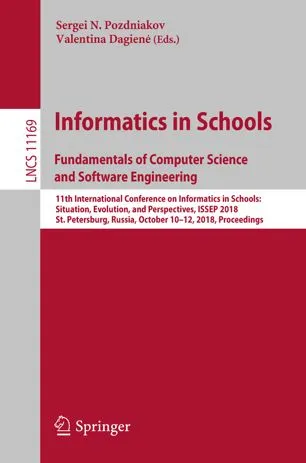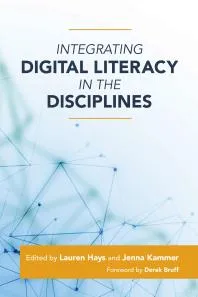Informatics in Schools. Fundamentals of Computer Science and Software Engineering: 11th International Conference on Informatics in Schools: Situation, Evolution, and Perspectives, ISSEP 2018, St. Petersburg, Russia, October 10-12, 2018, Proceedings
4.5
بر اساس نظر کاربران

شما میتونید سوالاتتون در باره کتاب رو از هوش مصنوعیش بعد از ورود بپرسید
هر دانلود یا پرسش از هوش مصنوعی 2 امتیاز لازم دارد، برای بدست آوردن امتیاز رایگان، به صفحه ی راهنمای امتیازات سر بزنید و یک سری کار ارزشمند انجام بدینکتاب های مرتبط:
معرفی کامل کتاب
کتاب Informatics in Schools. Fundamentals of Computer Science and Software Engineering مجموعه مقالات و یافتههای یازدهمین کنفرانس بینالمللی Informatics in Schools: Situation, Evolution, and Perspectives (ISSEP 2018) است. این کنفرانس در روزهای ۱۰ تا ۱۲ اکتبر سال ۲۰۱۸ در سن پترزبورگ، روسیه برگزار شد و موضوعات جدیدی در مورد آموزش علوم کامپیوتر و Software Engineering در مدارس را به بحث گذاشت. کتاب موردنظر بستری را برای متخصصین، معلمان و پژوهشگران فراهم میکند تا درباره روندهای جدید، چالشها و راهحلهای قابل اجرا جهت گسترش دانش فنی در سطح مدارس گفتگو نمایند.
خلاصهای از کتاب
این کتاب شامل مقالات کنفرانس ISSEP است که چهارچوبهای مختلفی از آموزش علوم رایانه و معرفتشناسی دیجیتال (Digital Epistemology) ارائه میدهد. هدف اصلی آن تأکید بر اهمیت آموزش ابتدایی و ثانویه در علوم کامپیوتر و مهارتهای مرتبط است. مؤلفان در این اثر به موضوعاتی همچون طراحی برنامههای درسی برای Computer science، پیادهسازی تکنیکهای جدید آموزش، و اهمیت توسعه مفاهیم بنیادین Algorithms و Programming میپردازند. همچنین تجربیات و مطالعات موردی که از چندین کشور جمعآوری شده است، موضوع را غنیتر میکند.
- پوشش موضوعاتی نظیر یادگیری محاسباتی، تفکر الگوریتمی، و نوآوری در کلاسهای درسی.
- تحلیل عمیق درباره چگونگی انطباق آموزش با دغدغههای قرن ۲۱.
- پیشنهاداتی برای بازنگری در ابزارهای آموزشی و تکنیکهای ارزیابی.
- معرفی پروژههای موفق از کشورهای مختلف با تمرکز بر آموزش پایه.
نکات کلیدی
- بیشتر کشورهای پیشرفته باید آموزش علوم کامپیوتر را به عنوان بخشی از برنامه درسی دبیرستان خود اجرا کنند.
- Step-by-step problem solving یک مهارت حیاتی است که در این کتاب بر آن تأکید شده است.
- تفکر محاسباتی (Computational Thinking) باید به صورت هدفمند تقویت شود.
- چالشهای روانشناختی و فرهنگی در پذیرش مفاهیم پیچیده علوم کامپیوتر مورد بررسی قرار گرفته است.
چرا این کتاب مهم است؟
با پیشرفت فناوری و نقش فزاینده آن در همه زمینههای زندگی، یادگیری علوم کامپیوتر و Software Engineering به عنوان مهارتهای اساسی برای همه افراد شناخته میشود. این کتاب به ما نشان میدهد چگونه میتوانیم آموزش این مهارتها را از پایه بنا کنیم و زمینههای رشد حرفهای و علمی دانشآموزان را گسترش دهیم. برای معلمان و تصمیمگیرندگان در بخش آموزش، این کتاب منبعی غنی از ایدهها و آموزههای سودمند فراهم میکند.
جملات مشهور از کتاب
“… introducing computer science at an early stage in education is not merely a technical necessity but a cultural imperative for preparing future generations.”
“Learning algorithms and programming develops a learner’s logical thinking and capacity to solve problems effectively.”
Introduction to the Book
The book Informatics in Schools. Fundamentals of Computer Science and Software Engineering provides an expansive and thorough look at the evolving landscape of informatics education across the globe, focusing particularly on its challenges, methodologies, and advancements in the context of schools. As the official proceedings of the 11th International Conference on Informatics in Schools (ISSEP 2018), held in St. Petersburg, Russia, this book serves as an essential resource for educators, researchers, and policymakers who are invested in shaping the future of computer science education at the school level. From foundational principles of teaching informatics to the exploration of innovative teaching techniques, the work encapsulates a broad spectrum of topics relevant to the cultivation of computational thinking in modern classrooms.
The conference brought together experts from around the world, all of whom share a commitment to enriching informatics education. The papers compiled in this book highlight both theoretical and applied research, portraying the dynamic interplay between pedagogy, curriculum design, and technology integration. With contributions from educators, software engineers, and curriculum developers, this book not only outlines the current "situation" but also charts the "evolution" and "perspectives" of teaching informatics—a timely and vital discussion in the digital age.
This introduction unpacks the core elements of the book and its relevance, delving into a detailed summary, key takeaways, notable insights, and the broader significance of this work within the context of informatics education.
Summary of the Book
At its core, the book is an academic anthology that highlights the efforts and results of the 11th ISSEP conference. Its content is meticulously structured to include diverse perspectives on the integration of computer science into school curriculums. Major topics include:
- Theoretical explorations into the teaching of computational thinking and problem-solving skills.
- Practical studies on the application of programming in classrooms using platforms like Python, Scratch, or Java.
- Discussions surrounding educational technologies designed to support informatics education.
- Ethical considerations involved in using data, automation, and artificial intelligence.
- Case studies from various countries, showcasing best practices and unique challenges in teaching informatics.
The diverse array of research compiled within the book reflects ongoing global interest in standardizing and innovating informatics education. It also underscores the importance of staying adaptive to educational trends and technological advances.
Key Takeaways
- Holistic Informatics Education: The book emphasizes that programming is just one aspect of informatics education. The development of computational thinking, problem-solving methodologies, and an understanding of algorithms are equally vital.
- Equity in Education: It highlights the need to make computer science accessible to all students, regardless of their socio-economic backgrounds, to reduce the digital divide.
- Interdisciplinary Approach: The book promotes the idea that computer science can benefit from being taught alongside disciplines such as mathematics, science, and even the arts.
- Global Collaboration: Shared experiences from the conference reveal that solutions to common challenges, such as teacher training and curriculum standardization, can benefit from interdisciplinary and international collaboration.
- Relevance of Ethics: Topics like AI and data privacy are increasingly significant within informatics curricula, and the book advocates for embedding these discussions into education at an earlier stage.
Famous Quotes from the Book
"Education in informatics should prepare students not only to use technology but also to understand and innovate with it, thereby shaping the digital future."
"The cornerstone of successful informatics education lies in fostering computational thinking—an intellectual skill that empowers students to approach problems systematically and express solutions clearly."
"Bridging the gap between education and emerging technologies ensures that the next generation is prepared to excel not just as consumers of technology, but as creators."
Why This Book Matters
In a world increasingly driven by technology, the education sector must adapt rapidly to prepare students for the challenges and opportunities of the digital age. Informatics in Schools is a pivotal resource because it encapsulates global best practices, embraces innovation, and fosters interdisciplinary approaches. The book matters for several reasons:
- Empowering Educators: It equips teachers with research-driven strategies to effectively integrate informatics into their classrooms.
- Bridging Gaps: By addressing issues such as the digital divide and inclusivity, it advocates for equitable access to computer science education.
- Anticipating the Future: It motivates readers to think critically about how evolving technologies will shape educational policies and curriculums in the coming years.
- Global Relevance: As a compilation of international insights, the book bridges cultural gaps and fosters collaborations in advancing informatics education worldwide.
Ultimately, this book is a call to action for stakeholders in education to reimagine and reframe how informatics is taught, ensuring that it remains forward-thinking and impactful in the decades to come.
دانلود رایگان مستقیم
شما میتونید سوالاتتون در باره کتاب رو از هوش مصنوعیش بعد از ورود بپرسید
دسترسی به کتابها از طریق پلتفرمهای قانونی و کتابخانههای عمومی نه تنها از حقوق نویسندگان و ناشران حمایت میکند، بلکه به پایداری فرهنگ کتابخوانی نیز کمک میرساند. پیش از دانلود، لحظهای به بررسی این گزینهها فکر کنید.
این کتاب رو در پلتفرم های دیگه ببینید
WorldCat به شما کمک میکنه تا کتاب ها رو در کتابخانه های سراسر دنیا پیدا کنید
امتیازها، نظرات تخصصی و صحبت ها درباره کتاب را در Goodreads ببینید
کتابهای کمیاب یا دست دوم را در AbeBooks پیدا کنید و بخرید
1252
بازدید4.5
امتیاز0
نظر98%
رضایتنظرات:
4.5
بر اساس 0 نظر کاربران
Questions & Answers
Ask questions about this book or help others by answering
No questions yet. Be the first to ask!














